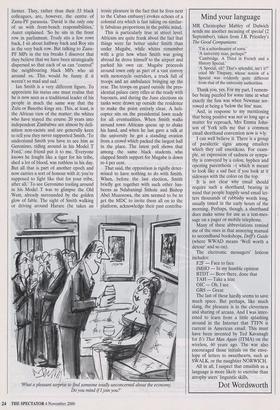Mind your language
MR Christopher Mabley of Dulwich sends me another meaning of special (2 September), taken from J.B. Priestley's The Good Companions:
`I'm a schoolmaster of sorts.'
`A university man, perhaps?'
`Cambridge. A Third in French and a History Special.'
`A Special, eh? That's splendid, isn't it?' cried Mr Timpany, whose notion of a Special was evidently quite different from that of the university authorities.
Thank you, yes. For my part, I remem- ber being puzzled for some time at what exactly the fuss was when Newman sor- rowed at being a 'below the line' man.
And, in response to my mentioning that being positive was not so long ago a matter for reproach, Mrs Emma John- son of York tells me that a common email shorthand convention now is +ly.
I can well believe it. There is a group of paralectic signs among emailers which they call emotikons. For exam- ple, an expression of sadness or sympa- thy is conveyed by a colon, hyphen and opening parenthesis :-( which is meant to look like a sad face if you look at it sideways with the colon on the top.
It is not clear why email should require such a shorthand, bearing in mind that people happily send email let- ters thousands of rubbishy words long, usually timed in the early hours of the morning. Perhaps, though, a shorthand does make sense for use as a text-mes- sage on a pager or mobile telephone.
Many of these abbreviations remind me of the ones in that annoying manual to secondhand bookshops, Driff's Guide (where WWAD means 'Well worth a detour' and so on).
The electronic messagers' lexicon includes: F2F — Face to face !MHO — In my humble opinion BTDT — Been there, done that TAH — Take a hint OIC — Oh, I see GR8 — Great The last of these hardly seems to save much space. But perhaps, like much slang, the pleasure is in the cleverness and sharing of arcana. And I was inter- ested to learn from a little splashing around in the Internet that TTFN is current in American email. This must have been invented by Ted Kavanagh for It's That Man Again (ITMA) on the wireless, 60 years ago. The war also encouraged those initials on the enve- lope of letters to sweethearts, such as SWALK, or the naughtier NORWICH.
All in all, I suspect that emailish as a language is more likely to exercise than atrophy users' linguistic skills.
Dot Wordsworth


























































































 Previous page
Previous page